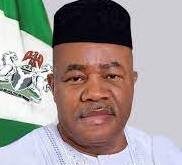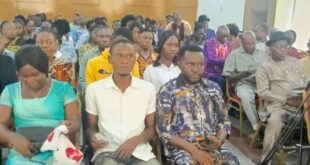By Joel Anekwe
Environmental Right Action/ Friends of the Earth Nigeria has advocated for energy democracy in Nigeria that is decentralised, people driven and socially controlled.
The environmental campaign group in making the call warned that energy colonialism was killing the Nigeria economy calling for energy system where citizens become energy producers as well as end users from mini-grids and non-grid systems that are less capital intensive.
Speaking at a two-day National Environmental Congress in Port Harcourt, Tuesday, Executive Director, Era/FoEN, Dr. Godwin Ojo explained that to promote energy democracy, “a percentage of the national budget should be dedicated to renewable energy research and development.
“All public finance, loans and subsidies being channeled to fossil fuel exploitation should be halted immediately and the funds invested in renewal energy to promote greater energy access for the over 170 million people in Nigeria”, he stated
He warned against attempts to make Nigeria a dumping ground for such obsolete cars and machines and further called for a ban on generator sets in all Ministries, Department and Agencies MDAs at the federal, state and local government levels.
He lamented that government policy on renewable energy were deficient, lacking in focus and devoid of community perspective.
He said: “The (the policies) have instead, opened opportunities for private investors in energy systems who are more interested in profits than actually bridging energy deficits. Persistence in fossil fuel dependency is the result of billions of Naira expended for generator and diesel for MDAs at the federal level which is replicated at the state and local levels of government”.
He further observed “despite the quantum leap in the developed economies, globally, more than 1.6 billion people have no access to electricity and about 2.4- billion depend solely on fuel wood. This is true in Africa and Nigeria, where rising energy demand is the cause of increasing violent resources, conflicts at the sites of extraction. Nigeria is nowhere near meeting it’s nationally determined commitment to addressing climate change reducing carbon emissions. About 70 per cent of our population depends solely on fuel wood for energy, representing one of the world’s highest deforestation rate of 3.5 percent annually”
Dr. Ojo said that the focus of the 2018 Congress on post-extractivism and energy democracy was to highlight the possibilities of life after oil in Nigeria saying “It is the quest to steer this nation away from fossil fuels dependency to alternatives in renewable energy sources”.
Dr. Sylvester Odion Akhaine, associate professor and acting head, Department of Political Science, Lagos State University, was the keynote speaker at the congress.
 PH Mundial – Port Harcourt Online Newspaper News Across The Region
PH Mundial – Port Harcourt Online Newspaper News Across The Region




